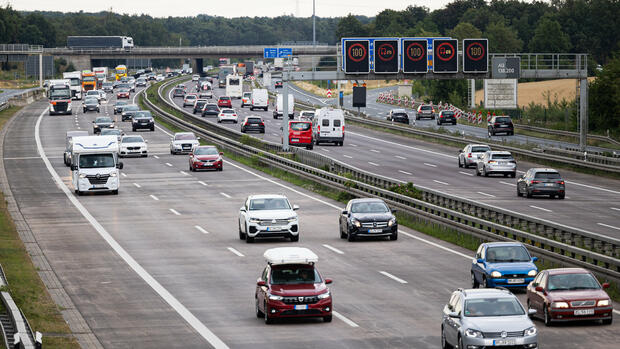The transport sector in particular emits so many greenhouse gases that Germany may not reach its climate targets.
(Photo: dpa)
Berlin According to a projection by the federal government, Germany will not achieve its climate goals in either 2030 or 2045. This emerges from the projection report, which the ministries are currently coordinating and which the Federal Government will then transmit to the EU Commission. The report is available to the Handelsblatt.
According to this, too many emissions are produced in addition to the transport sector in industry and heating. Therefore, according to the projection report, “the target of net greenhouse gas neutrality by 2045 (…) will be clearly missed”.
The Federal Government must draw up a corresponding report every two years. In it, a research team led by the Öko-Institut and the Fraunhofer Institute for Systems and Innovation Research analyzes whether the measures planned and decided by the government help to reduce emissions.
The biggest problem remains the transport sector, which will emit around 200 million tons of carbon dioxide too much by 2030 – about as much as cars, trucks, buses, trains and planes currently produce in 15 months.
The decisive factor here is that traffic will increase significantly by 2050. At the same time, according to the report, Germany will not become the leading market for electromobility as planned: Instead of the targeted 15 million electric cars, at most 8.2 million will be on the roads by 2030, the researchers expect. One reason is that cars with combustion engines will not be allowed to be sold until 2035.
Only then will electrification pick up speed, so that in 2050 “only battery-powered electric cars will be newly registered, with the exception of very few fuel cell vehicles”. Instead of the 47 million petrol and diesel engines on German roads today, the experts expect there will only be a good five million combustion engines.
The demand for a new purchase premium is getting louder
It is questionable with which new measures the federal government wants to react. According to the report, the planned heating law will help to “almost” achieve the climate targets in the building sector by 2030 by switching to heat pumps, district heating and biomass, but there is no perspective in transport.
For example, the “Germany ticket” in local transport, which the federal and state governments are funding with three billion euros, causes “only insignificant changes” in the possible purchase of a car, as the report says. The climate effect is small at significantly less than one million tons per year.
Above all, the federal government wants to expand the charging networks in order to promote e-car traffic.
(Photo: IMAGO/MiS)
The electrification of car traffic is more significant. However, the SPD, FDP and Greens refuse to subsidize the purchase of e-cars for much longer. In view of the sales crisis that was already beginning, the Ministry of Economics only announced last week that it would increase the funds for the purchase premium, which had been reduced since 2023. But it should be over by 2025 at the latest.
Criticism comes from the Federal Association for eMobility, which calls on the federal government to cancel state aid for combustion engines. “Anyone who takes away the tax benefits from petrol and diesel vehicles and consistently imposes a CO2 tax on them has enough budget to pay a purchase premium for all electrically powered vehicles and to give German manufacturers the absolutely necessary information for a product range that is desirable in terms of climate policy,” said CEO Markus Emmert.
The traffic grows and grows
The government has already extended the purchase premium for trucks until 2028. Especially heavy trucks on long-distance routes are responsible for a large part of the emissions. However, according to the report, a significant number of them will not be driving with electric drives until 2030 at the earliest.
Another obstacle on the way to climate neutrality is the overall increase in traffic. According to the report, by 2050 trucks will cover significantly more distances per year than they do today. People will also drive more cars than they do now. Railways will transport around ten percent more people.
In local public transport, on the other hand, the number of kilometers related to the number of people transported is halved. The experts explain it like this: the more e-cars there are on the market, the cheaper it will be to drive again. That’s why people will then use the bus and train less again.
The government had actually set itself the goal of significantly increasing the share of rail transport in the German mobility mix. That’s why she wants to invest billions extra in the rail network. The experts see the greatest climate effect in giving carbon dioxide a clear price and giving tax preference to vehicles with climate-neutral drives.
More: Resistance to the climate toll for trucks
